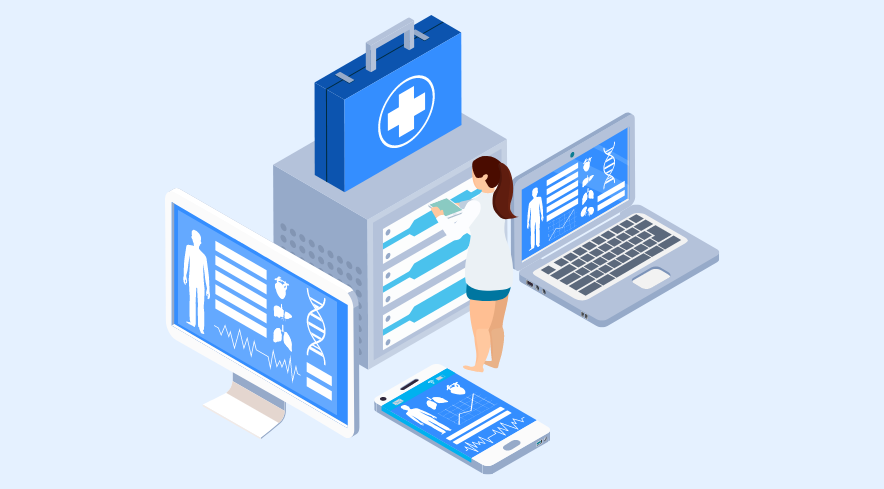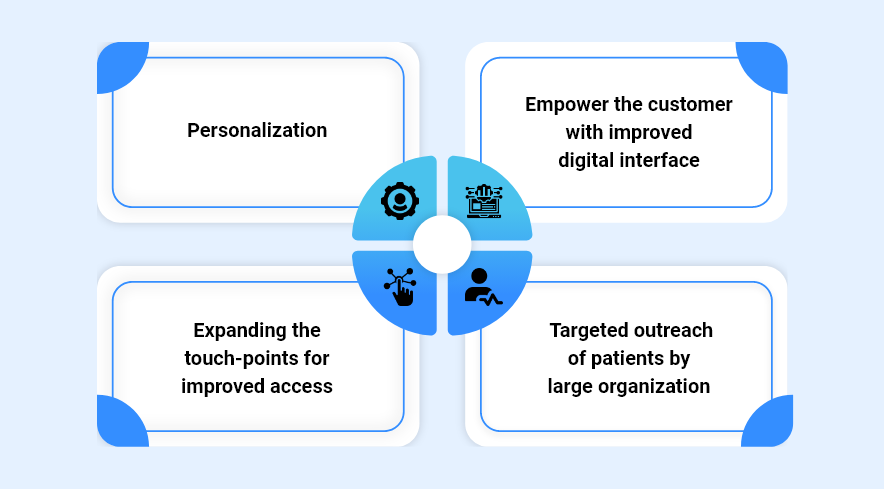The shifting focus of consumers from being a silent receiver of medical care from predetermined authorities to adopting more proactive ways. This includes managing own health and taking informed decisions for dear ones from the options available.
A million-dollar question is in place faced by B2B marketers today. The snowballing effects of this subject are radiating across all the levels of socio-economic arrangements. It is affecting the providers, the payers, designers and the deciders. A significant food for thought for B2B marketers, which is definitely going to change the dimensions of marketing.
1. Personalization – Personalization of patient experience has become the key today. Be it empowering them for more options, in each category, ease of virtual appointments with convenience of time and place or catering to the most niche requirement of the patient which he/she wants to keep confidential. It has become imperative to serve the patient today with the desired service in its most specific form like a minimal invasive surgical process or a painless treatment, or else they will choose the next best option.
Here lies the silver lining for B2B marketers in terms of cost-effectiveness, optimum utilization of resources and yet serving the customer with what they want in their own terms.
2. Empower the customer with improved digital interface- We live in a pandemic-struck era where altogether a new platter of items suddenly became our daily requirement. Starting from a home-bound rapid antigen kit for testing for Covid-19, oximeters, smart masks to accessing electronic health records of self or dear ones in hospitals, patients want to be at the forefront of every decision.
Quick fact- A well-designed chat-bot with a catchy name and a connecting persona increases the chances of patient-interaction and repeat usage.
Also, many AI tools are designed to understand the moods, tone and choice of words.
3. Expanding the touch-points for improved access- In the wake of an ongoing pandemic scenario, it is imperative that working only on the existing channels of search-engine based queries is not fulfilling the requirements. There is a requirement of broader channels, like collaboration with retailers, app-based community management system, etc. depending upon the social health determinants of patients.
Segmentation is the key when it comes to designing virtual health solutions. A clear understanding of the demographics viz age, income, education, etc. should be considered. For example, patient portals to access the medical records of family members should be easy to navigate as this will be handled by people of from various walks of life.
4. Targeted outreach of patients by large organization- Healthcare consumerism in 2022 is an interesting subject leading to different results with the set of patient-behavior. Appointment-scheduling patterns generate interesting results, like cancellation tendencies and frequency, follow-up grounds and inclination, grounds of negative feedback, etc. This data is very useful for studying patient behavior and customize the offerings by large corporations.
1. Pricing transparency – A majority of the patients in the middle- and lower-income brackets either do not take the prescribed treatment or resort to alternate methods of treatments. These instances clearly indicate the need of a revisiting the economical workouts by the healthcare marketers. This would also answer the affordability issues and expand the customer-base under the umbrella of digital healthcare relationships.
2. Product/ Service development transparency – Today’s patients are more informed than ever and seek clarity on the product/service development process. A transparent system obviously meeting the protocols in place would open new gates of customer-interaction.
Standing In 2022, one thing which is certain among the ingoing uncertainties is that medical services have become more consumer-centric than ever. To be ahead of the competition, it is a must for healthcare service providers to be proactive in understanding the requirements of the audience and transform their product/service ideas aligning to the sophisticated habits of modern days. Convenience, digitalization, comparable options, a complete picture of the out-of-pocket costs are some of the factors that would help them in this long way to go.










